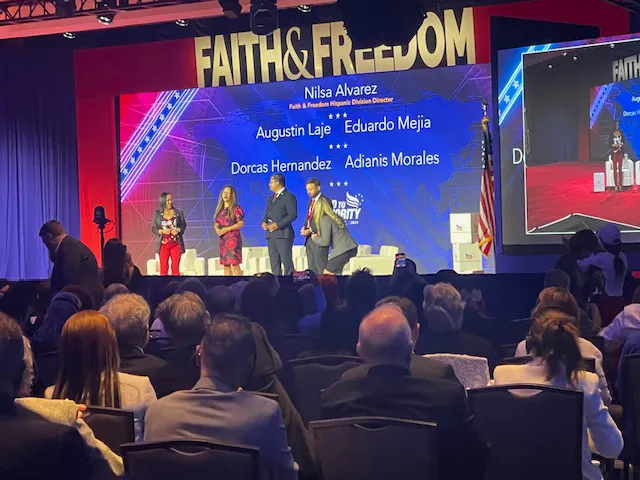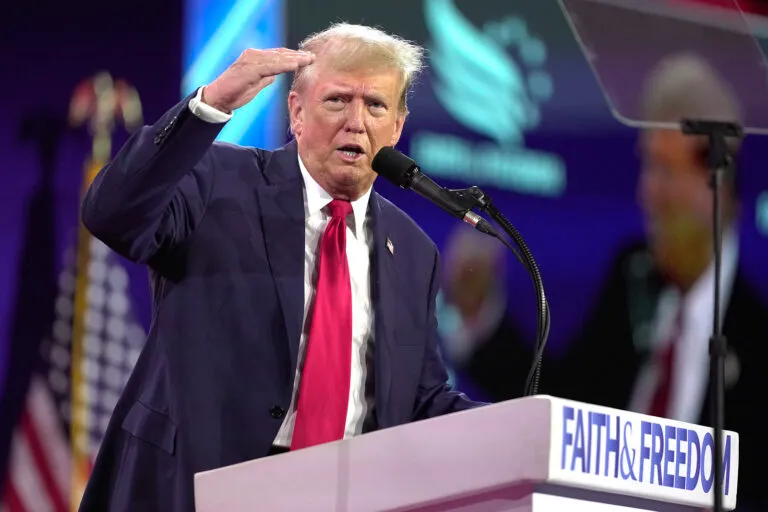Introduction
In a pivotal moment for American politics, the Road to Majority Policy Conference recently took place, highlighting the evolving dynamics of the GOP’s relationship with religious nationalism. This annual gathering, organized by the Faith & Freedom Coalition, serves as a focal point for understanding how former President Donald Trump plans to maintain his grip on the Christian right amidst a shifting political landscape. This article delves into the details of the conference, exploring the nuances of Trump’s engagement with evangelical leaders, the evolving demographic of the Christian right, and the broader implications for American politics.
The Road to Majority Conference: A Historical Context
Origins and Purpose
The Road to Majority Policy Conference has been an influential event in the political calendar since its inception in 2010. Founded by Ralph Reed, a prominent figure in the conservative Christian movement, the conference aims to unite Christian conservatives around shared values and political objectives. Over the years, it has become a critical platform for rallying support and shaping the political discourse among religious conservatives.
A New Era of Political Engagement
This year’s conference was particularly notable for its focus on Donald Trump, reflecting a broader trend in which Trump’s political strategy increasingly intersects with religious nationalism. The event provided a stage for Trump to reinforce his image as a divinely protected leader, a narrative that has become central to his appeal among evangelical voters.
Trump’s Divine Protection Narrative
The Assassination Attempt and Its Implications
In July, Trump survived an assassination attempt, an event that his supporters have framed as evidence of his divine protection. This dramatic incident has been used to bolster his image as a leader chosen by a higher power, a narrative that was reinforced at the Road to Majority Conference. The portrayal of Trump as a candidate with celestial backing is intended to resonate deeply with Christian conservatives who view political engagement through a spiritual lens.
The Road to Majority Conference: A Platform for Divine Endorsement
The conference was a testament to Trump’s sustained effort to align himself with the Christian right. Through a series of speeches and endorsements, Trump and his allies sought to consolidate support from evangelical leaders and voters. The event underscored the extent to which Trump’s political strategy is intertwined with religious symbolism and rhetoric.

The Demographic Shift in the Christian Right
Expanding Beyond Traditional Evangelicals
One of the most significant developments at this year’s conference was the noticeable shift in the demographics of the Christian right. Traditionally dominated by older, white evangelicals, the movement is now increasingly inclusive of younger, more diverse voices. This year’s conference saw a broader representation of Catholic, Pentecostal, and charismatic Christians, reflecting a changing landscape within the conservative Christian community.
The Role of Diversity in Shaping Political Strategy
The inclusion of diverse voices is not merely symbolic; it reflects a strategic adaptation to a more heterogeneous electorate. By broadening its appeal, the Christian right aims to maintain its political relevance in an increasingly diverse America. This demographic shift is pivotal for understanding how Trump and the GOP are recalibrating their approach to engage with a broader spectrum of religious conservatives.
The Abortion Debate: A Cornerstone of the Conference
Celebrating the Dobbs Decision
A central theme at the conference was the celebration of the Supreme Court’s Dobbs decision, which overturned Roe v. Wade. This landmark ruling was hailed by many speakers as a significant victory for the pro-life movement. The conference served as a platform for reinforcing anti-abortion messages and rallying support for further legislative action.
Trump’s Evolving Stance on Abortion
Trump’s approach to the abortion debate has been somewhat fluid, reflecting his need to balance the expectations of his base with broader electoral concerns. At the conference, Trump hinted at a possible compromise on abortion policy, signaling an awareness of the need to appeal to voters in swing states who may be wary of stringent abortion bans. This nuanced position highlights the complex dynamics of Trump’s engagement with the issue and his attempt to navigate the intersection of ideological fervor and electoral pragmatism.
Immigration and Crime: A Polarizing Issue
The Road to Majority Conference’s Stance on Immigration
Immigration emerged as a contentious issue at the conference, with several speakers attributing rising crime rates to the Biden administration’s policies. The conference echoed familiar rhetoric linking immigration to crime, despite a lack of supporting evidence in crime statistics. This narrative aims to stoke fears and mobilize voters around a hardline immigration stance.
The Contradictions in State-Level Policies
The discourse on immigration at the conference also highlighted contradictions within the GOP. While national leaders criticized the Biden administration’s approach, Republican governors like Greg Abbott of Texas and Ron DeSantis of Florida have engaged in similar practices, sending migrants to Democratic-leaning cities. These inconsistencies reveal the complexities and competing priorities within the GOP’s approach to immigration policy.
International Issues and Conspiracies
The Middle East Conflict and Global Protests
The conference also touched on international issues, including the conflict between Hamas and Israel and related student protests in the U.S. Speakers blamed the current administration for these global and domestic events, framing them as part of a broader ideological struggle. This perspective reflects the tendency to interpret international conflicts through a partisan lens.
Conspiracy Theories and Global Politics
A notable feature of the conference was the discussion of various conspiracy theories, particularly regarding U.S. foreign policy and domestic legal issues. Speakers alluded to a range of conspiracies, from alleged deep state operations to globalist agendas, reflecting a broader trend of distrust in established institutions and narratives.
The Legal and Political Landscape
Allegations of Weaponization of the Justice System
The conference included discussions on the perceived weaponization of the justice system against political adversaries. Panels addressed concerns about overcriminalization and the treatment of Trump’s legal troubles, reflecting broader anxieties about the fairness and integrity of the legal system. This discourse underscores the polarized nature of contemporary American politics, where legal issues are often framed as part of a larger ideological struggle.
Calls for Action and Mobilization
The conference concluded with a strong emphasis on mobilization and political action. Ralph Reed’s call to action, including extensive voter outreach efforts, reflects a strategic focus on energizing the conservative base. This approach aims to translate the conference’s enthusiasm into tangible electoral gains, leveraging the collective energy and commitment of attendees to influence upcoming elections.
Conclusion
The Road to Majority Policy Conference provided a comprehensive snapshot of how Trump and the GOP are engaging with the Christian right amidst a changing political landscape. Through a blend of religious symbolism, demographic shifts, and strategic messaging, Trump aims to consolidate support from evangelical and conservative voters. As the political season unfolds, the dynamics observed at this conference will likely play a significant role in shaping the trajectory of American politics.


